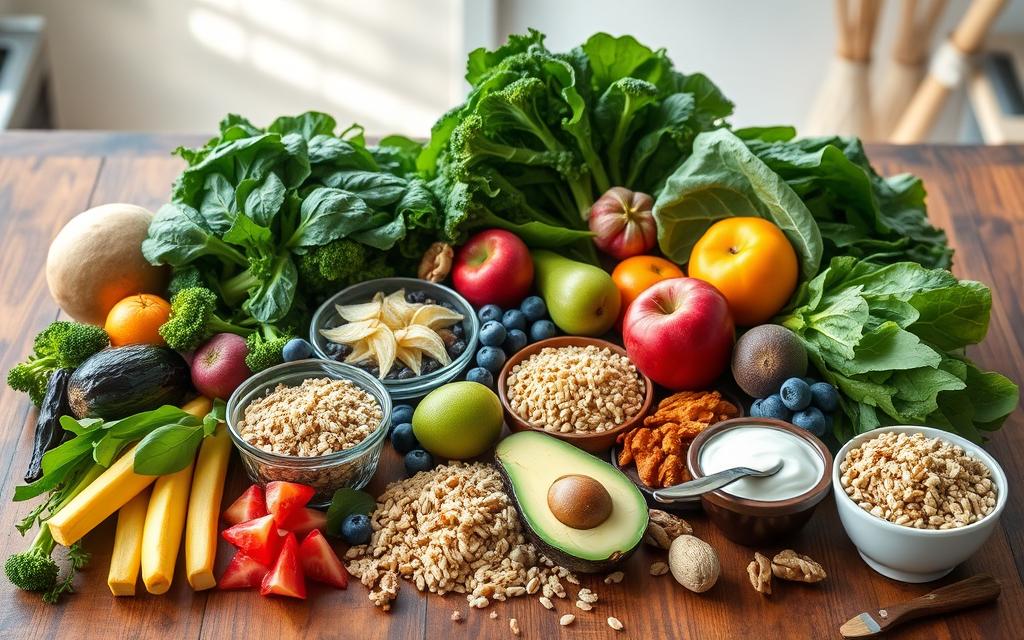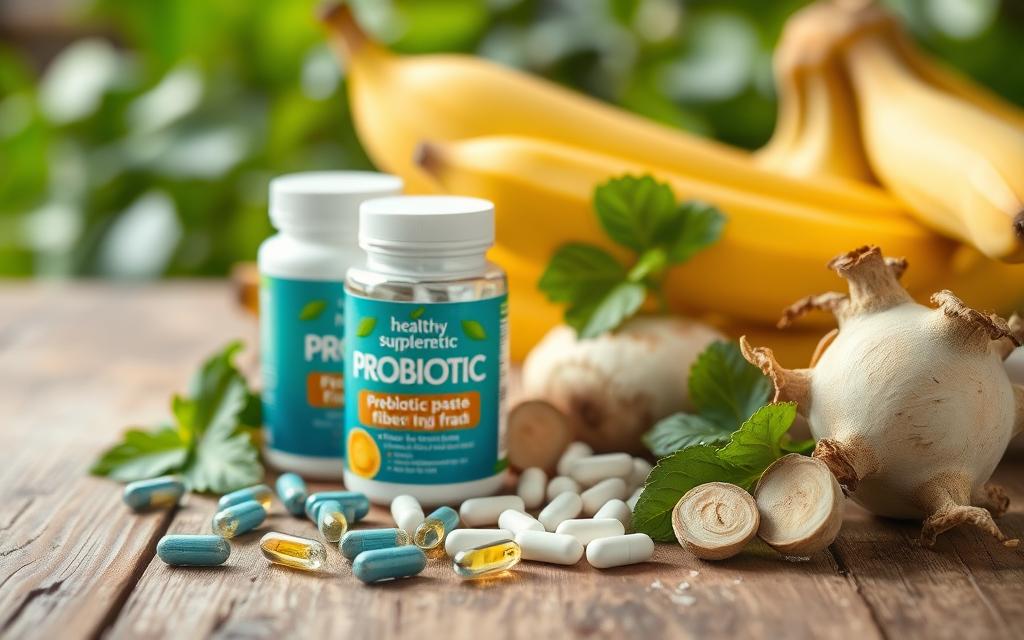In today’s fast world, health often gets overlooked. Yet, keeping your gut healthy is key for feeling good. Leaky gut syndrome, with its increased intestinal permeability, lets harmful stuff into your blood. Knowing how to stop leaky gut is vital for feeling better and avoiding health problems like inflammatory bowel disease and obesity1.
By adopting good habits for your gut, you can balance your microbiome. This leads to less discomfort and better health. This article offers detailed advice and practical tips for a healthier lifestyle. It helps you avoid the risks of leaky gut.
Key Takeaways
- Understanding leaky gut is vital in preventing related health issues.
- A healthy diet rich in nutrients is fundamental for gut health.
- Hydration plays a key role in maintaining gut function.
- Managing stress effectively can improve your gut health.
- Regular exercise supports a healthier gut microbiome.
- Good quality sleep is essential for optimal gut function.
- Identifying and avoiding environmental toxins can enhance gut health.
Understanding Leaky Gut: What It Is and Why It Matters
Leaky gut, also known as increased intestinal permeability, happens when the lining of the intestines gets damaged. This damage lets harmful substances like toxins and bacteria into the blood. It can cause long-term inflammation and other health problems.
Even though doctors don’t officially call it a disease, knowing about it is important. It can affect your health in big ways.
Definition of Leaky Gut
Leaky gut syndrome is when the walls of the intestines get weak. This lets harmful stuff into the blood. Things like diet and stress can make this happen.
Stress, medicines, and toxins can make it worse. This can lead to symptoms that make everyday life hard2.
Common Symptoms to Watch For
Symptoms of leaky gut include stomach pain, digestive issues, and feeling very tired3. You might also get bloated or have diarrhoea. These symptoms can really upset you.
Not treating leaky gut can lead to serious health problems. This includes inflammatory bowel disease and type 1 diabetes4. Knowing the signs helps you get help early.
The Role of Diet in Preventing Leaky Gut
Diet is key to keeping your gut healthy. Knowing which foods to eat and avoid can boost your gut health. An anti-inflammatory diet helps reduce inflammation and supports good gut bacteria.
Foods to Include for a Healthier Gut
Eating gut-healing foods can help your digestive system. The Mediterranean diet is great because it includes:
- Fibrous vegetables like broccoli and spinach
- Fermented foods such as kimchi, sauerkraut, and yoghurt
- Omega-3-rich fish like salmon and mackerel
- Whole grains and legumes for improved fibre intake
- Nuts and seeds as a source of healthy fats
The Mediterranean diet lowers the risk of metabolic syndrome and heart disease5. It also reduces harmful gut bacteria and boosts good bacteria5. Foods like prebiotics in this diet help with immune function and reduce inflammation5. Eating these foods can improve nutrient absorption and lower disease risks, including type 2 diabetes and obesity5.
Foods to Avoid for Optimal Gut Health
It’s also crucial to know which foods to avoid. Avoiding processed foods, refined sugars, and gluten is key. These can cause inflammation and health problems like inflammatory bowel disease and metabolic syndrome6. The Western diet, with its processed foods and unhealthy fats, harms gut diversity6. So, sticking to an anti-inflammatory diet with whole foods is essential for a healthy gut.

Importance of Hydration in Gut Health
Drinking enough water is key for a healthy gut. It helps nutrients move well and waste leave the body. Not drinking enough can cause problems like constipation and bloating7.
Water also helps break down food. This is why it’s so important for your gut7.
How Water Affects Gut Function
Water’s role in gut health is more than just digestion. Not drinking enough can cause inflammation in the gut. This can slow down digestion and lead to issues like leaky gut7.
But, drinking enough water can help. It reduces inflammation and keeps the gut healthy7. You can check if you’re drinking enough by looking at your urine. If it’s clear or pale yellow, you’re good. Darker urine means you need to drink more7.
Tips for Staying Hydrated Throughout the Day
Adding simple steps to your day can boost your gut health. Here are some tips:
- Set reminders to drink water all day.
- Use a refillable water bottle to stay hydrated.
- Add fruits or veggies to your water for taste.
- Drink less coffee and alcohol, as they dehydrate you.
- Eat more fruits and veggies that are full of water.
Following these tips can help your gut function better and keep you healthy7.

The Impact of Stress on Gut Health
Stress and gut health are closely linked through the gut-brain connection. This connection shows how our emotions can affect digestion and gut function.
Stress and the Gut-Brain Connection
Stress can upset the balance of gut bacteria, causing issues like leaky gut. It can change the types of bacteria in our gut, affecting our health. People under stress often have unpredictable changes in their gut bacteria, which can lead to cravings, metabolism issues, and mood swings.
Research shows that stress hormones can make harmful bacteria levels soar, up to 10,000 times in just 14 hours8. Stress also makes the gut barrier more permeable, letting bacteria into the bloodstream and causing inflammation9.
Techniques to Manage Stress Effectively
Using stress management techniques is key to a healthy gut. Here are some daily habits to consider:
- Mindfulness practices like meditation can calm the mind.
- Regular exercise reduces stress and boosts gut health.
- Yoga combines physical activity with mindfulness, helping with emotional control.
- Eating a balanced diet supports both mental and gut health, fighting stress effects.
- Getting enough sleep is vital for recovery and a healthy gut-brain connection.
By tackling stress with these methods, we can improve our gut health and lower the risk of stress-related problems9. For more on the gut-brain connection, check out this resource.
Prebiotics and Probiotics: Key to a Healthy Gut
Learning about prebiotics and probiotics can really help your gut health. Probiotic supplements are key for a balanced gut. They add good bacteria, helping with digestion and boosting your immune system.
The Benefits of Probiotics
Probiotics, found in foods like yogurt and kefir, help with digestion. They also might make you feel mentally better. A study found that a diverse gut microbiome leads to better health, as it helps with nutrient absorption and overall wellness10.
Research from ZOE shows that eating fermented foods boosts “good” gut bacteria. This is linked to better health. The biggest nutritional study found specific gut bacteria that improve health, showing how probiotic-rich foods are great for your gut11.
How to Incorporate Prebiotics into Your Diet
Prebiotics feed the good bacteria, helping them grow. Foods like garlic, bananas, flax seeds, and whole grains are full of prebiotics. Adding these to your meals helps keep your gut healthy, preventing problems like dysbiosis10.
Eating foods rich in both prebiotics and probiotics boosts your gut’s diversity. This diverse gut flora is good for many health benefits, like reducing inflammation and improving immune function. This shows why a balanced diet is so important10.

Regular Exercise and Its Benefits for Gut Health
Regular exercise is key for a healthy gut. It boosts physical fitness and improves gut health. It helps with digestion and bowel movements, cutting down constipation risks12.
Exercise also helps those with inflammatory bowel disease and irritable bowel syndrome. It makes them feel better in their stomachs1312.
Types of Activities That Support a Healthy Gut
Adding different exercises to your routine helps your gut. Here are some good ones:
- Walking – It’s simple but works well, keeping digestion and bowel movements regular.
- Strength Training – It builds muscle and supports healthy gut bacteria.
- Cycling – It’s fun and boosts blood flow to the gut.
- Yoga – It improves gut health with gentle stretches and poses.
Active people have more diverse gut bacteria than those who don’t exercise. This is good for the gut microbiome balance1314.
Establishing an Exercise Routine
For the best gut health, do at least 150 minutes of moderate exercise weekly. Mix aerobic and strength-training for better results. Being consistent is important, as regular exercise boosts good bacteria and reduces bad ones like Clostridium difficile12.

Finding what works for you is crucial. Keep an eye on how you’re doing and tweak your routine as needed. Exercise is a big help in keeping your gut healthy and preventing gut-related problems1314.
Sleep’s Influence on Gut Health
Getting quality sleep is key for your health, especially for your gut. Studies show a strong link between sleep and digestion. Poor sleep can change your gut’s balance of good and bad bacteria15.
On the other hand, an unbalanced gut can disrupt sleep. This creates a cycle that harms both your gut and sleep16.
The Connection Between Sleep and Digestion
Not sleeping well can increase the risk of stomach problems. Lack of sleep can make you choose unhealthy foods, which is bad for your gut16. Some gut bacteria are linked to how well you sleep. A diverse gut microbiome is tied to better sleep15.
Poor sleep can lead to bloating and inflammation. This creates a cycle of discomfort17.
Tips for Improving Sleep Quality
To improve your sleep, try these tips:
- Stick to a regular sleep schedule.
- Make your bedroom dark, quiet, and cool.
- Stop using screens an hour before bed to avoid blue light.
- Try relaxation exercises like meditation or deep breathing before bed.
- Avoid heavy meals and processed foods close to bedtime to ease digestion16.
Eating a diet full of fruits, veggies, whole grains, and fermented foods helps your gut. This can improve your sleep quality15. By making these changes, you can better your gut health and overall well-being.
Avoiding Toxins in Your Environment
It’s important to cut down on household toxins to keep your gut healthy. Many everyday items, like cleaners and personal care products, can harm your gut. Knowing about these toxins helps you make better choices for your health.
Common Household Toxins to Watch Out For
- Artificial fragrances found in cleaning products and air fresheners
- Phthalates present in plastic containers and personal care items
- Formaldehyde released from furniture and building materials
- Heavy metals from contaminated water supply
- Common pesticides used in gardens and kitchens
Natural Alternatives for a Toxic-Free Home
Using natural alternatives can greatly lower your exposure to harmful chemicals. Here are some good swaps:
- Vinegar as a natural disinfectant for surfaces
- Baking soda for odour control and cleaning
- Essential oils, such as tea tree oil, for antimicrobial properties
- Beeswax wraps instead of plastic for food storage
- Homemade cleaning solutions to avoid harmful additives
It’s also key to watch out for toxins in other areas. Processed foods often have additives that can harm your gut. Choosing whole foods and checking labels can help you steer clear of these. Taking steps to protect your gut from toxins is a big step towards better health1819.
Building Healthy Habits for Long-Term Gut Wellness
Creating healthy habits is key for a healthy gut. Start with meal prep, drink plenty of water, and find ways to relax. Eating foods like fruits, veggies, and whole grains is good for your gut. Avoid foods high in sugar and fats.
Research shows a diverse gut microbiome is important for health. It also helps with mood and reduces inflammation2021.
Daily Routines to Support Gut Health
Make small, daily changes to boost your gut health. Regular exercise, enough water, and balanced meals are great. Remember, stress can harm your gut, so try mindfulness21.
Setting Realistic Goals for Lifestyle Changes
Start with small, achievable goals for better gut health. Aim for gradual changes in your diet and lifestyle. This way, you build lasting habits and improve your health2021.
FAQ
What is leaky gut and why should I be concerned about it?
How can I prevent leaky gut through my diet?
What role do hydration and water play in gut health?
How does stress affect gut health?
What are prebiotics and probiotics, and how do they contribute to gut health?
How important is exercise for maintaining gut health?
Can poor sleep impact my gut health?
What household toxins should I be aware of that may affect my gut health?
How can I build healthy habits for long-term gut wellness?
Source Links
- https://www.medicalnewstoday.com/articles/326102 – Leaky gut diet: Foods to eat and avoid
- https://nutritiondiets.co.uk/health/how-to-heal-leaky-gut-the-functional-medicine-approach/ – How To Heal A Leaky Gut: The Functional Medicine Approach
- https://www.medicalnewstoday.com/articles/326117 – Leaky gut syndrome: What it is, symptoms, and treatments
- https://pmc.ncbi.nlm.nih.gov/articles/PMC9862683/ – Leaky Gut and the Ingredients That Help Treat It: A Review
- https://pmc.ncbi.nlm.nih.gov/articles/PMC10773664/ – Elucidating the role of diet in maintaining gut health to reduce the risk of obesity, cardiovascular and other age-related inflammatory diseases: recent challenges and future recommendations
- https://www.alprofoundation.org/scientific-updates/diet-gut-and-inflammation:-in-sickness-and-in-health/ – Diet, gut and inflammation: in sickness and in health
- https://pendulumlife.com/blogs/news/how-hydration-affects-your-gut-health?srsltid=AfmBOorXGpeCELz8Ws475fDeTTpPXpZY8nqJLRGbXSOl7dsEnYJmvtZD – How Hydration Affects Your Gut Health
- https://blog.vibrant-wellness.com/the-surprising-impact-of-stress-on-gut-health – The Surprising Impact of Stress on Gut Health
- https://pmc.ncbi.nlm.nih.gov/articles/PMC7213601/ – Stress, depression, diet, and the gut microbiota: human–bacteria interactions at the core of psychoneuroimmunology and nutrition
- https://www.gaucherdisease.org/blog/4-ways-to-improve-gut-health-naturally/ – 4 Ways to Improve Gut Health Naturally – National Gaucher Foundation
- https://zoe.com/learn/how-to-improve-gut-health – 16 Science-Backed Ways To Improve Gut Health
- https://northeastdigestive.com/blog/how-exercise-affects-the-gut/ – How Exercise Affects The Gut – Northeast Digestive
- https://zoe.com/learn/exercise-gut-microbiome – Can Exercise Improve Your Gut Microbiome?
- https://pmc.ncbi.nlm.nih.gov/articles/PMC9474385/ – The Connection Between Physical Exercise and Gut Microbiota: Implications for Competitive Sports Athletes
- https://sleepopolis.com/education/sleep-gut-connection/ – The Connection Between Sleep and Gut Health | Sleepopolis
- https://www.henryford.com/blog/2021/02/sleep-affects-gut-health – How Lack Of Sleep Can Affect Gut Health
- https://zoe.com/learn/gut-health-affects-sleep – How Gut Health and Sleep Affect Each Other
- https://healthpath.com/leaky-gut/what-are-the-best-foods-for-leaky-gut/ – Leaky Gut: Foods to Eat and Food to Avoid | Healthpath
- https://dublincfm.com/digestive-health/leaky-gut/how-to-identify-and-avoid-foods-that-trigger-leaky-gut/ – How To Identify And Avoid Foods That Trigger Leaky Gut – Dublin Centre for Functional Medicine
- https://www.myvegan.com/blog/nutrition/how-to-improve-gut-health/ – Your One-Stop Guide To Good Gut Health & Wellness | Myvegan
- https://drwillcole.com/gut-health/the-definitive-functional-medicine-guide-to-all-things-gut-health – How To Naturally Heal Your Gut









